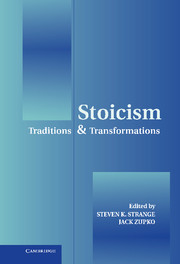Book contents
- Frontmatter
- Contents
- List of Contributors
- Acknowledgments
- List of Abbreviations
- Stoicism
- Introduction
- 1 The Socratic Imprint on Epictetus' Philosophy
- 2 The Stoics on the Voluntariness of the Passions
- 3 Stoicism in the Apostle Paul: A Philosophical Reading
- 4 Moral Judgment in Seneca
- 5 Stoic First Movements in Christianity
- 6 Where Were the Stoics in the Late Middle Ages?
- 7 Abelard's Stoicism and Its Consequences
- 8 Constancy and Coherence
- 9 On the Happy Life: Descartes vis-à-vis Seneca
- 10 Psychotherapy and Moral Perfection: Spinoza and the Stoics on the Prospect of Happiness
- 11 Duties of Justice, Duties of Material Aid: Cicero's Problematic Legacy
- 12 Stoic Emotion
- Works Cited
- Name Index
- Subject Index
10 - Psychotherapy and Moral Perfection: Spinoza and the Stoics on the Prospect of Happiness
Published online by Cambridge University Press: 11 July 2009
- Frontmatter
- Contents
- List of Contributors
- Acknowledgments
- List of Abbreviations
- Stoicism
- Introduction
- 1 The Socratic Imprint on Epictetus' Philosophy
- 2 The Stoics on the Voluntariness of the Passions
- 3 Stoicism in the Apostle Paul: A Philosophical Reading
- 4 Moral Judgment in Seneca
- 5 Stoic First Movements in Christianity
- 6 Where Were the Stoics in the Late Middle Ages?
- 7 Abelard's Stoicism and Its Consequences
- 8 Constancy and Coherence
- 9 On the Happy Life: Descartes vis-à-vis Seneca
- 10 Psychotherapy and Moral Perfection: Spinoza and the Stoics on the Prospect of Happiness
- 11 Duties of Justice, Duties of Material Aid: Cicero's Problematic Legacy
- 12 Stoic Emotion
- Works Cited
- Name Index
- Subject Index
Summary
Expressing the inimitable tranquillity of the Stoic sage, Seneca declares that
it is impossible … for anyone either to injure or to benefit the wise man, since that which is divine does not need to be helped, and cannot be hurt; and the wise man is next-door neighbour to the gods and like a god in all save his mortality…. The man who, relying on reason, marches through mortal vicissitudes with the spirit of a god, has no vulnerable spot where he can receive injury.
Perhaps one of Stoicism's greatest points of appeal, prominent in its resurgence in the early modern period, is its assertion that happiness is attainable by any rational individual. Moreover, this happiness is, as Seneca depicts it, a this-worldly salvation: the rational individual can aspire to a perfect happiness, a tranquillity impervious to any and all assaults of Fortune. Such is the virtue of Stoic ethics famously celebrated in the sixteenth century by Justus Lipsius, who, exasperated by the conflicts raging within the Christian tradition and the horrific wars accompanying them, looked to Stoicism for an alternate source of moral sustenance and the prospect of genuine respite from public tumult – to be sure, nothing less than an enduring peace of mind. According to the Stoic model, such eminent tranquillity, which entails perfecting one's intellect, is founded on a specific collection of doctrines: an immanentist theology whereby God and the universe are rational in nature and can be perfectly apprehended by the human mind; virtue that is readily indicated in natural impulse; a diagnosis of the passions, the primary obstacle to virtue, in terms that immediately invoke their susceptibility to remedy; and, finally, psychotherapy as the means to happiness, a means that is subject to individual agency and responsibility.
- Type
- Chapter
- Information
- StoicismTraditions and Transformations, pp. 198 - 213Publisher: Cambridge University PressPrint publication year: 2004
- 1
- Cited by



